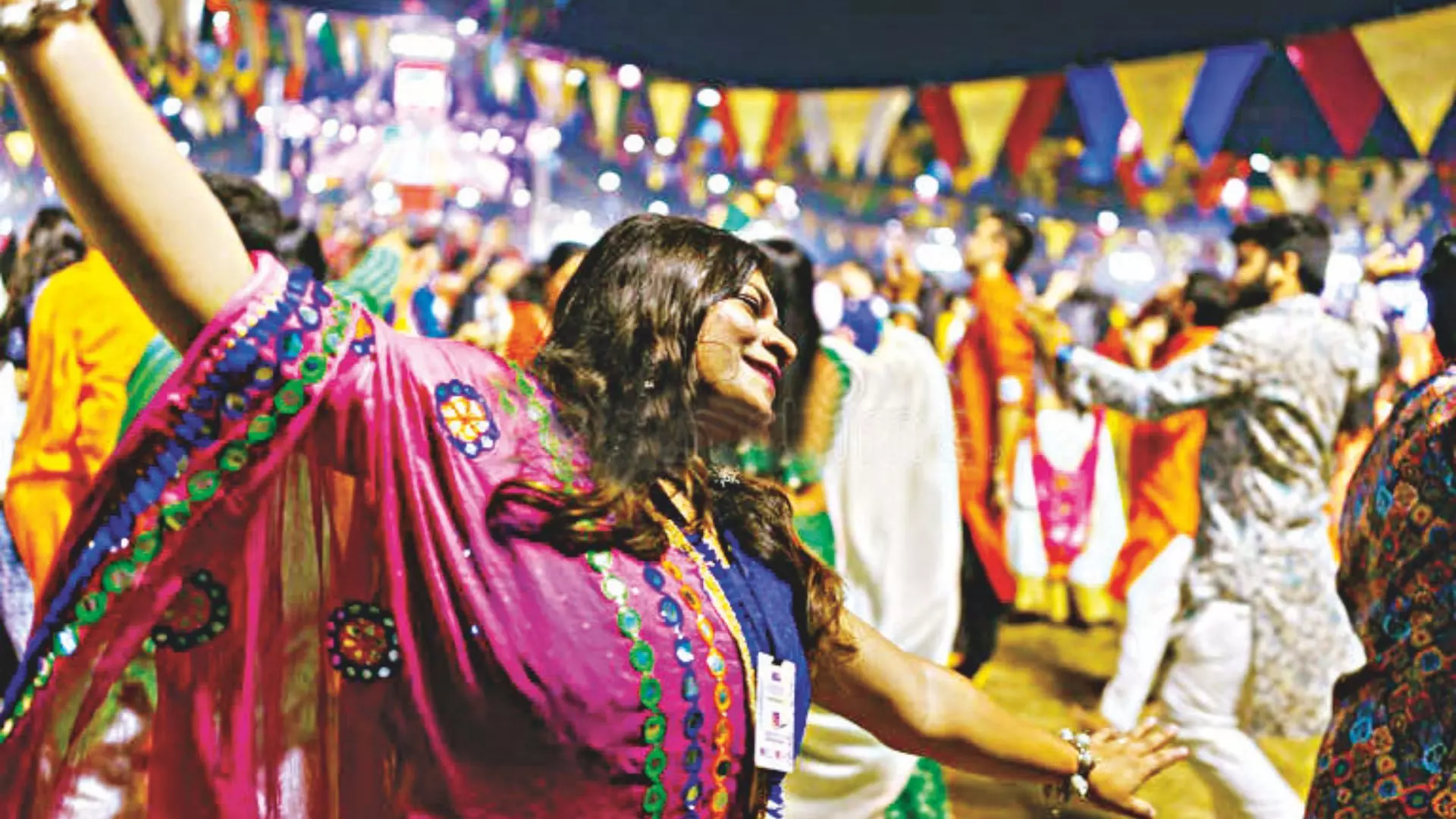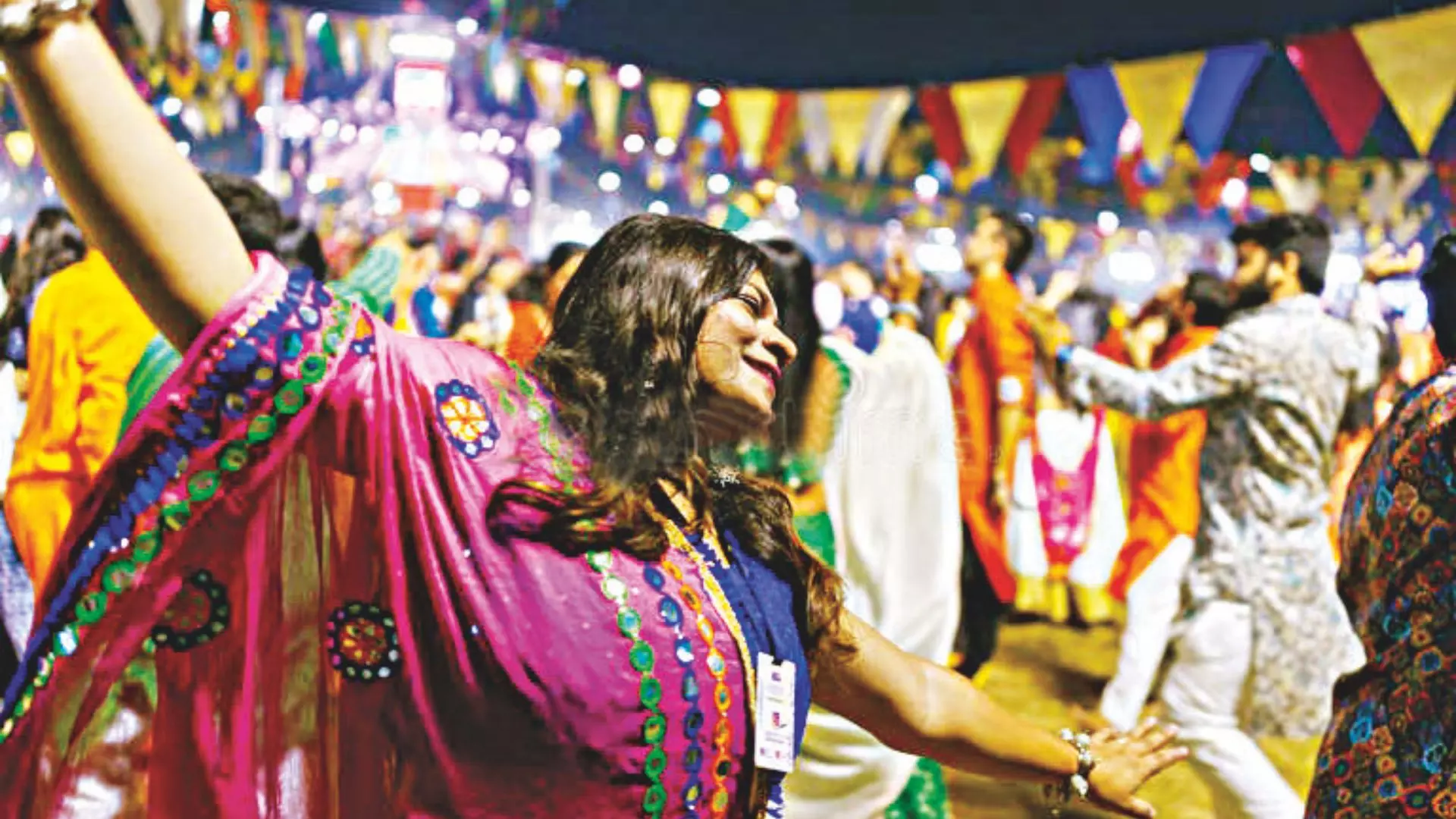
From top builders to corporates, and politicians, everybody is splurging money on Navratri events (dandiya, garba and bhondla) this year. Some netas and sponsors are going around in circles with innovative ideas to connect with the Almighty and the Aam Janta, while youngsters are having a field day – dancing, chomping on sumptuous food and donning their best Navratri attires. The 9-day Navratri festival fervour is spreading all over the country. For many, Navratri is not just a religious festival but a time for community building, reconnecting with cultural roots and celebrating India’s diversity and unity.
Dance & Devotion
There are several Navratri events in Gujarat, Pune, Mumbai, Hyderabad, Delhi and Kolkata, but most youngsters are desperately waiting to dance and immerse in the mesmerizing voice of Garba Queen Falguni Pathak. She is performing for the seventh consecutive year at the Swargiya Pramod Mahajan Maidan, Mumbai. Speaking about the country’s most coveted garba event, Falguni tells media persons, “My energy and passion come from my fans and Ambe Ma. Every year, we aim to bring something new. This year will be exceptional too. The enthusiasm of the youngsters and garba dancers acts like fuel to our performance.”
Dandiya For Cops
But why should only youngsters have all the fun? How about giving a much-needed break to our police force? Shaina NC, a fashion designer and BJP spokesperson from Mumbai has organized Garba and Dandiya Nights specifically for the Mumbai Police. “This event is an ode to the officers and their families, who dedicate their days and nights to serving and protecting the city. It’s our time to show our appreciation and support for them,” Shaina says.
The event will take place on October 10-11. It will be attended by Maharashtra’s Chief Minister Eknath Shinde, Deputy CM Devendra Fadnavis, and a galaxy of stars, including Sonali Kulkarni, Sunil Grover, and Falguni Patakh to name a few.
The eclectic nights of Navratri are here, a festival dedicated to the worship of Goddess Durga, also known as ‘Shakti.’ Each pandal has its unique theme, but the common thread that runs through them all is the celebration of tradition, community, and devotion. Navratri pulses with the rhythm of devotional “bhakti” songs, soulful music, and the spirited beats of garba raas. Women twirl gracefully in their colourful ghagras and cholis, while men bring energy to the floor in their kediyu or kotis.
Different Forms
The garba, bhondla, or dandiya dance is an offering. It is a circular dance movement representing the circle of life, revolving around an image or representation of Goddess Durga. Kinjal Dasondi, a French Professor and garba enthusiast from Mumbai, says, “Garba is like a spiritual dance for me. The music is composed in such a way that I start moving to the rhythm naturally.”
Rutvika Gala, a fashion designer and Garba enthusiast says, “As a Gujarati, Navratri is the only festival where we can deeply worship our Kuldevi. So it holds immense spiritual and cultural significance for us. Moreover, Garba runs in our veins—we play it at every celebration, be it a wedding or an engagement—but Garba during Navratri holds a special place in our hearts.”
A Melting Pot
The Kora Kendra Garba in Borivali, Mumbai is one of the biggest and most famous Garba events. Known for its traditional yet energetic atmosphere, it attracts a crowd of over 15,000 people each night. The ticket prices here range from `600 to `1,200, depending on the night and the performers scheduled.
The NESCO Grounds in Goregaon is yet another famous place to witness live performances, and energetic Garba, and Dandiya nights. Tickets typically range from `800 to `2,500, depending on the performer lineup.
No Navratri can ever be completed without the event of Raas Garba by Falguni, held at various locations across Mumbai. Tickets for her events are priced exorbitantly high. Gala, who never misses the chance to attend Falguni’s concert each year says, “She just sets the atmosphere right, with her soulful singing. Even though it’s insanely crowded.” Mitika Varma, a dancer from Mumbai seconds her saying, “The experience of attending a Falguni Pathak Garba, is worth every penny.”
Birthplace of Garba
Gujarat, the birthplace of Garba, hosts some of the most iconic Garba events in the country. Cities like Ahmedabad and Vadodara become hubs of activity during Navratri, attracting participants from across India and even the world.
In Ahmedabad, the United Way of Baroda Garba is perhaps the most famous. Held at the University Grounds, this event is known for its large-scale participation and festive atmosphere. Vadodara, often referred to as the cultural capital of Gujarat, also hosts several renowned Garba events. The Vadodara Navratri Festival, held at the Navlakhi Grounds, is known for its cultural performances and traditional Garba.
One of the key aspects of Garba pandals, especially in Gujarat and Mumbai, is the balance between grandeur and accessibility.
Khushi Darji, a commerce graduate, states, “I love playing Garba, but paying `800 for a ticket only to dance in a confined space can be frustrating.”
Community, Tradition, Fashion
Garba pandals are more than just places to dance. They are spaces where people come together, forget their worries, and immerse themselves in the joy of the festival. The sense of community is palpable—strangers become friends as they dance together in perfect harmony, and the shared experience of devotion to the Goddess creates a bond that transcends social and economic divides. Navratri is also a hub of fashion. “Every year, I notice new trends—crop tops, spaghetti straps, or unique ways of draping the dupatta. Even when we mix Western styles with the traditional chaniya choli, we still find ways to honour our culture,” says Gala.
She also mentions how wearing oxidized jewellery, pairing the outfit with a traditional blouse from rural Gujarat, or even sporting tattoos inspired by the rural women of Gujarat have now become popular among city girls.
As the heart-thumping beats of the “Dhol Baje, Dhol Baje” echo through the night, the Garba pandals stand as a testament to the enduring spirit of joy, unity, and celebration that defines Navratri. Whether in the bustling cities of Gujarat or the vibrant streets of Mumbai, Hyderabad, and Delhi, Garba is a celebration of life itself — a dance of devotion, community, and pure, unadulterated joy.
A joyous swirl
The lively and colourful ambience of the Garba grounds, decked with glittering lights, is simply magical. We assemble with friends and family dressed in traditional clothes and prepare to dance. The night begins with the beats of the dhol and the melodious tunes of Garba songs flooding the atmosphere. The intensity is contagious. The finest thing is the sense of oneness and camaraderie. Everyone, no matter their age, joins in the fun. Elders lead us with their exquisite movements, and we, the youth, added our passion to the mix. As the hours went, we’d swap stories and laugh, taking small breaks to eat excellent Gujarati snacks and desserts.” — Pratiksha Prashant, Creative Director at Kishandas & Co
